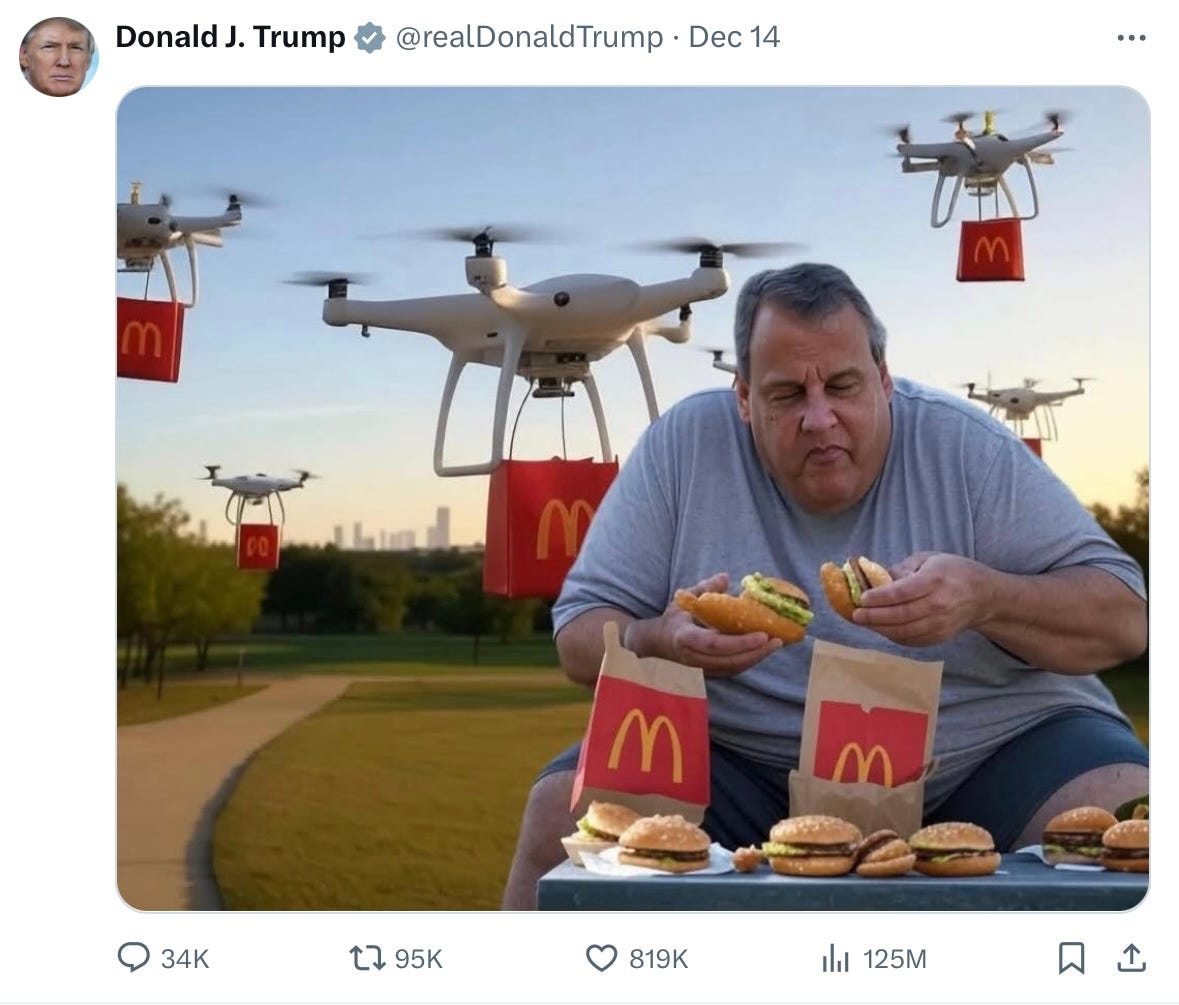The Republican Party Isn’t a Trump Cult
Trump has always been symptom of the party’s base, not the cause.
The majority House Republican caucus appears certain to reject a last-minute spending deal that would keep the government open through March and fund disaster relief, among other priorities. Speaker Mike Johnson is now looking for a “Plan B” (which I previously thought he opposed) to try and prevent a government shutdown the weekend before Christmas. I have plenty of well-documented issues with our budgetary process, and believe that libertarian-leaning politicians who try and shut down every spending bill are doing themselves more harm than good by preventing a proper annual budgetary process, which lead to these massive omnibus spending bills that get put to a vote at the last minute.
The most interesting part about this entire exercise this afternoon, however, was not the spending bill failing. We’ve seen plenty of that over the last decade and a half, even when, like today, the party that tanked the bill was in fact that party in power. The most interesting part was what happened afterwards. J.D. Vance, who I am occasionally reminded is actually going to be vice-president in a few weeks, tweeted the transition team’s official joint response:
The weirdest part of this is that J.D. Vance tweeted it. It’s got elements of Trump tweets in there, but usually Trump will not cede the spotlight to someone else. Why did he send it out and not Donald Trump? In fact, Trump hasn’t tweeted in four days, last posting this important bit of presidential transition communication:
So it’s time to go back in time and do our favorite 2017 activity: Trump White House Kremlinology!
These big spending bills are always unpopular with the Republican base, poisoned against them since Obama’s era due to obstructionist tactics. Yours truly was involved in that, having worked for and with organizations who pushed that on the base, so I've witnessed it firsthand. (One of many mea culpas about my time in GOP opposition in that era.) Still, a government shutdown now would be embarrassing and poorly timed, especially during the transition. It would be difficult to blame Biden and the Democrats, as the bill is unable to pass the GOP-majority House.
Trump’s team obviously want this thing passed and done so they can get settled back in before having to worry about another spending bill. As we saw in 2017, it’s unlikely that anyone outside of Rand Paul or Thomas Massie would oppose any spending requested by the Trump White House. Mike Johnson broke many of his own preferences with dealing with spending bills to get this to the floor, and is now getting the full Trump treatment being blamed for it. I don’t doubt what Vance wrote about wanting the debt ceiling expansion to happen under Biden, even if that is a brazenly hypocritical thing to say (“we know we have to raise the debt ceiling, we just don’t want to do it.”)
What stuns me, though, is how cowardly Donald Trump is. He lost this bill because his assortment of grafting groupies, led by Elon Musk, started tweeting against it. The more jello-spined among the House GOP began responding, the Fox News base-train started rolling, and only then did Trump come out against it. Then he had his hapless vice president-elect tweet a statement claiming that they had concerns with the “Democrat” elements of the bill but sullenly admitting they do need to pass a continuing resolution of some kind, pretty please. Trump didn’t immediately put out a statement though, and when he did he seemed to tank the whole effort - threatening Republicans who vote even for a “clean CR” without extra riders needed to help pass the bill with a primary in 2026 unless they also pass a debt ceiling increase, mirroring the statement Vance put out. He did this because he understands something many who look at the Trump-era GOP from the outside don’t: this isn’t a Trump cult.
It’s popular to say that Trump runs the party like a cult. Anything he does is popular, right, and the party can change its opinions on issues on a dime. The truth is a lot more complex. The Republican Party is, like the Democrats, not run by one man, one TV network, one ideology. It’s run by a bunch of activists and donors and voters, who decide what the priorities are. It’s easy to blame Trump, blame Murdoch, blame Bush (I believe you should always blame Bush). In reality, there are plenty of examples where Trump himself has changed opinions to match the party, as opposed to the more widely-documented examples of him changing the party. He was pro-choice before running for president. Most notably, he of course started Operation Warp Speed, which led to the creation of the initial COVID vaccines, something which he clearly wanted to be a part of his legacy but has ignored and gone the other way on as his voter base became more anti-vaccine. More recently his administration seems to be moving to the far-left on processed food, sounding more like an elite EV-driving Whole Foods shopper than the president who invited a championship football team to dine on fast food during a government shutdown.
There is a misconception that his voters won’t ever abandon him, and on behavior or corruption issues I think that’s right. I disagree that his voters won’t leave him on ideological grounds - it’s just that he is a good enough politician, with few ideological moors other than immigration and tariffs, already popular among his base, to sail in the direction he feels he needs to. That does give outsize influence to others like Elon Musk, who commands a slightly different ideological group of nutjobs and weirdos (we call them the New Blue Checks) who right now attach themselves to Trumpism. There is no guarantee that they will remain on Trump’s side, and today’s actions seem to indicate that Trump understands that threat.
Note: in transparency, the original version of this article was written before Trump put out a statement urging the House Republicans to pass a CR with a debt ceiling increase, mirroring Vance’s statement. One paragraph has been updated as a result since it happened literally an hour after publication.




